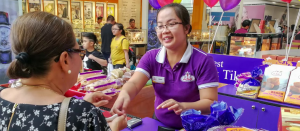By Nyj Verdadero
Many of us see the names of successful Filipino businessmen with Chinese surnames and automatically think they were born into a rich family. We then discredit their success, thinking they had their family to fund their business and back them up in times of trouble. But not many of us know that some of these businessmen have gone through many hardships and experienced many failures before they reached their current status.
Here is a story that show’s being born into a family with a business does not guarantee success.
The Story of Gerry Chua
It was back in the ‘80s when a 21-year-old Gerry Chua took over his family’s debt-ridden business. The Chinese deli was established in 1912 by his grandfather. It was a simple stall but it rose to fame because of their selection of traditional Chinese delicacies such as hopia, tikoy, and glutinous balls.
But, situated in a competitive market, the family business’ success started to wane and they became just one of the many stores in Binondo selling Chinese delicacies. Their hopia, which was supposedly their bread and butter, became infamous for being as hard as a rock, sending customers away and toward their competitors. As creditors, suppliers and friends deemed that the business was doomed to fail, so they started turning a cold shoulder on Gerry’s family.
Gerry was in a desperate situation. His family didn’t have enough money to pay their debts or even restock supplies such as sugar and flour. As young as he was, Gerry would go to the bank after school to inquire about their debt. During this time, eight of their checks would bounce in a day because of how his father handled payments. Gerry found himself counting every centavo from his small daily sales and saving them to honor his family’s debts.
Because of their predicament, Gerry decided to do something drastic. He took it upon himself to improve their hopia. To cut on labor costs, he baked the hopia himself and drove as far as Cavite and Quezon to deliver their products to public markets. He tweaked his family’s recipe and used corn oil to thin out their hopia’s hard, dry crust. The product became significantly better but there were no drastic changes in their sales.
A Stroke of Genius Paired with Hard Work
During these hard times, Gerry found himself frequenting an air-conditioned supermarket in Ongpin to cool off. The supermarket’s security guard started becoming suspicious of him and tailed him one day. To appear casual, he asked an ice cream vendor what their bestselling flavor was. The vendor replied “ube,” and it was at that moment that Gerry had a stroke of genius.
Gerry bought six jars of ube and blended it into a batch of hopia. Upon tasting one, he knew he had a winner. He went to Pampanga and learned the art of ube making from the province’s best ube makers. What was left of his friends told Gerry that his idea wouldn’t succeed, but he persevered. Even when he received a lukewarm reception with his new product, Gerry kept going.
Armed with a directory of people from Cebu and Davao, lent by family and friends, Gerry made a mailing list of possible clients. He typed addresses on each envelope and sent free coupons to residents in those cities. Even though Eng Bee Tin didn’t have stores there, many people who received the coupons became curious enough to ask family and friends in Manila to buy this ube hopia and send it to them.
Slowly, orders trickled in. The ube hopia also gained more attention with the help of a friend who made it possible for Gerry to export to the US. Eventually, more and more orders came in from abroad. Business was finally good.
But the rewards for all of Gerry’s goodness and hard work didn’t end there. During this time Gerry helped CityLine staff and host Ms. Cory Quirino feature the Ongpin district. He played host to them and assisted them in going around and interviewing people. To express her gratitude, Ms. Quirino featured his ube hopia on her show.
That media exposure catapulted Eng Bee Tin to previously unimagined heights. We could say that the rest is history but that would be a betrayal to the continued innovation and hard work that Gerry and his children put into the local business to make the hopia empire what it is today.
Continued Hard Work and Innovation
Before he let his children take over, Gerry introduced more new things to the company. “I’ve always believed in innovating and trying new things – not only with flavors but also in marketing, PR and machinery,” Gerry told The Manila Times.
Back in the ‘90s, some of his family members and fellow bakers ridiculed him when he bought a P900,000 equipment to automate peanut ball manufacturing. They called him crazy, ambitious and mayabang for buying the machine since the amount was considered big in the ‘90s and since peanut balls were only sold after Chinese New Year. Gerry said he was confident to take risks because he kept his grandmother’s business philosophy in mind: it’s OK to make a small profit as long as their product’s quality is great and customers will keep on coming back.
Like many Filipino-Chinese, Gerry believes in prudent spending but he also believes in investing in ingredients, people and equipment because he’s looking at the bigger picture. Now, Gerry’s children are at the helm of Eng Bee Tin and they are applying the same principles their father did when he was starting the business.
In its industry, Eng Bee Tin isn’t only considered the first to experiment with hopia flavors. It is also the first in the Philippines to use foil, pillow packaging, metal detectors, and X-ray equipment as part of its quality assurance methods.
Eng Bee Tin Today


